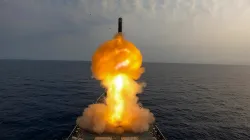India inks defence deals worth Rs 39,125 crore in major boost to govt’s ‘Make-in-India’ push
These deals will further bolster indigenous defence capabilities, save foreign exchange and lessen India’s dependency on manufacturers of equipment overseas in the future.

In a significant boost to the ‘Make-in-India’ initiative of the Centre, the Ministry of Defence (MoD) sealed five major defence acquisition contracts worth Rs 39,125 crore including procurement of BrahMos supersonic cruise missiles, radars, weapon systems and aero-engines for MiG-29 jets in the national capital on Friday (March 1). The contracts were exchanged in the presence of Defence Minister Rajnath Singh and Defence Secretary Giridhar Aramane.
What are the contracts?
Out of the five contracts, one was with Hindustan Aeronautics Limited for procurement of Aero-engines for MiG-29 aircraft, second with Larsen and Toubro Limited for procurement of Close-in Weapon System (CIWS) and procurement of High-Power Radar (HPR) and two with BrahMos Aerospace Private Limited (BAPL) for procurement of BrahMos missiles and procurement of Ship borne BrahMos system for the Indian Defence Forces.
These deals will further bolster indigenous defence capabilities, save foreign exchange and lessen India’s dependency on manufacturers of equipment overseas in the future.
Details of the contract
The contract for RD-33 Aero Engines for MiG-29 aircraft has been signed with Hindustan Aeronautics Limited (HAL) at a cost of Rs 5,249.72 crore. These aero engines will be produced by the Koraput Division of HAL.
These Aero Engines are expected to fulfil the need of the Indian Air Force (IAF) to sustain the operational capability of the MiG-29 fleet for its residual service life. The aero engines will be manufactured under a Transfer of Technology (TOT) licence from the Russian OEM. The programme will focus on the indigenisation of several high-value critical components, which would help increase the indigenous content of future Repair and Overhaul (ROH) tasks for RD-33 aero-engines.
Contract for CIWS
The contract for procurement of CIWS has been signed with Larsen and Toubro Limited at a cost of Rs 7,668.82 crore.
CIWS will provide terminal air defence to select locations in the country. The project will boost and encourage the active participation of Indian aerospace, defence, and associated industries, including MSMEs. The direct and indirect employment generated by this project would be approximately 2,400 persons per year over the course of five years.
Contract for HPR
The contract for procurement of HPR has also been signed with Larsen and Toubro Limited at a cost of Rs 5,700.13 crore. It will replace existing long-range radars of lAF with modern Active Aperture Phased Array based HPR with advanced surveillance features.
It will significantly enhance the terrestrial Air Defence capabilities of IAF with integration of sophisticated sensors capable of detection of small Radar Cross Section targets. It will boost to indigenous radar manufacturing technology as it would be first of its kind radar built by the private sector in India. The direct and indirect employment generated by this project would be approximately average of 1,000 people per year over the course of five years.
Contract for BrahMos
The contract for procurement of BrahMos missiles has been signed with BrahMos Aerospace Private Limited (BAPL) at a cost of Rs 19,518.65 crore. These missiles would be utilized to meet combat outfit and training requirements of the Indian Navy. This project is likely to generate employment for nine lakh man-days in Joint Venture entity and around 135 lakh man-days in ancillary industries (including MSMEs) in the country.
The contract for Procurement of Ship borne BrahMos system has also been signed with BrahMos Aerospace Private Limited (BAPL) at a cost of Rs 988.07 crore. This system is the Indian Navy's primary weapon for maritime strike operations fitted onboard various frontline warships.
The system is capable of hitting land or sea targets from extended ranges with pinpoint accuracy at supersonic speeds. The project is likely to generate employment of around 60,000 man-days over a period of 7-8 years.
(With ANI inputs)
ALSO READ | DRDO conducts two successful flights tests of Very Short-Range Air Defence System
